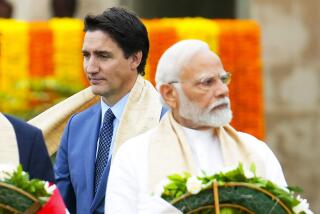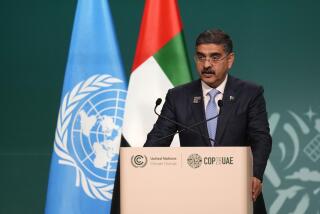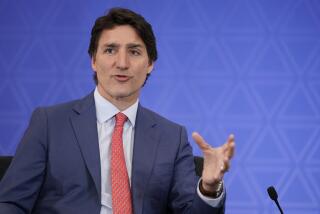Pakistan denies official involvement in Mumbai attacks
ISLAMABAD, PAKISTAN — Pakistan on Tuesday forcefully denied a suggestion by India’s prime minister that official Pakistani agencies were involved in November’s attacks in the city of Mumbai and said that leveling such accusations posed “grave risks” to the region.
With this latest exchange of sharp words, tensions between the nuclear-armed neighbors appeared to be increasing anew. In the weeks since the three-day rampage by gunmen in India’s commercial capital, the two sides have made alternately conciliatory and bellicose comments.
Last month, Pakistan repositioned some troops along the Indian border and said India had activated forward air bases, but most analysts said they did not believe the two sides intended to go to war.
The statement Tuesday by Prime Minister Manmohan Singh was the closest India has come to accusing the Pakistani government of links to the attacks, for which India blames the Pakistan-based militant group Lashkar-e-Taiba. U.S. intelligence supports the view that the group was largely responsible.
Pakistan has acknowledged that “non-state actors” may have played a role in the Mumbai assault but has vehemently denied official involvement, although Lashkar-e-Taiba had a history of ties to the nation’s intelligence apparatus.
Singh, without offering details, declared in New Delhi that “given the sophistication and military precision of the attack, it must have had the support of some official agencies in Pakistan.”
Pakistan called that assertion “irresponsible.”
“Vilifying Pakistan or . . . any of its state institutions on this score is unwarranted and unacceptable,” the Foreign Ministry said in a statement. “This is a sure way to close avenues of cooperation in combating this menace.”
Other Pakistani officials accused India of fomenting tensions and warned the government in New Delhi against staging any kind of preemptive strike.
“If India takes military action against Pakistan, it would be a big mistake,” Foreign Secretary Salman Bashir told Pakistani lawmakers. “India is pushing this region to war.”
India on Monday handed over a 100-page dossier of evidence against the Mumbai suspects, including transcripts described as the confession of the one believed to be the lone surviving gunman and documentation of the attackers’ phone communications with Pakistan-based handlers.
Pakistani officials, who have previously demanded proof of Indian allegations that the attackers came from their nation, brushed aside the claims raised in the dossier. Deputy Foreign Minister Malik Emaad Khan described it as “so-called evidence.”
Most Pakistani newspapers’ reports on the Indian presentation put the word “evidence” in quote marks in their headlines.
At the same time, though, Pakistan has been under increasing U.S. pressure to cooperate fully in the investigation and to crack down on militant groups implicated in the attacks.
Richard Boucher, the U.S. assistant secretary of State for South and Central Asian affairs, visited Islamabad on Monday for talks with Pakistani leaders. Although noting Pakistan’s arrest of a “significant” number of suspects in the Mumbai attacks, the envoy suggested that more needed to be done.
“There’s not much so far” in the way of cooperation between India and Pakistan in the investigation, Boucher said.
--
More to Read
Sign up for Essential California
The most important California stories and recommendations in your inbox every morning.
You may occasionally receive promotional content from the Los Angeles Times.










